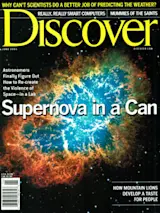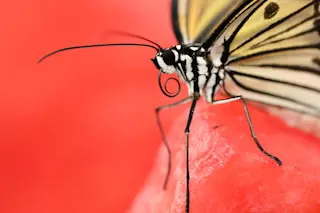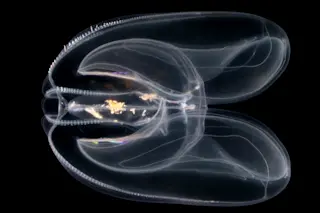Where did we come from? For anthropologists like Milford Wolpoff of theUniversity of Michigan, that question provokes contentious scientificdebate. One side believes Homo sapiensdescended from a single female "Eve" whose progeny spread around theglobe, replacing more archaic species, some 100,000 years ago. Wolpoffand others take the opposing view that humanity emerged as much as 2million years ago in many places as people colonized the world andgradually evolved to their modern state. Wolpoff discussed thelingering debate with Discover associate editor Kathy A. Svitil.
What will settle the debate?I think the evidence, both anatomic and genetic, has been there a longtime. It tells us that the Eve theory is wrong. For instance, variousskeletal features show continuity of form, from ancient to modern, inseveral parts of the world. The Eve theory predicts abrupt change.
Some people have interpreted your theory to mean that certain races are more evolved than others. How do you respond to that?Iget deeply upset to think that I've ever contributed to racism, even ifit is only by people misquoting me. What people are generally quotingis the idea that modern humans arose in one place and then went aroundinterbreeding with everyone else, which opens itself up to a racistinterpretation. What I've actually said is that modern featuresdeveloped everywhere and spread everywhere because they were helpful.
How has that understanding affected your views on race?Thereare no pure races. Our populations are thoroughly mixed, and we arerelated to everybody. The idea that one race could be better atsomething than another race makes no sense. If a trait is important,everyone has it.
Can we ever reconstruct a perfect human family tree?No,because the tree model doesn't fit population history well. Trees arethings that branch and branch and branch, but populations don't justdivide— they also merge back together. Just look at America. A networkof lines that merge together as well as lines that divide apart is amuch better model. But we won't get a perfect network either. There istoo much we will never know.
How do you feel about the creationists who use such uncertainties to attack evolution?I'mmore upset about the racism. Creationism isn't science. It is a beliefabout religion, a belief about origins. The things that creationistssay— that all life was created by God in six days, for example— arescientifically wrong, but I have no quarrel with them as pieces ofreligion.
Does your research suggest evolution favors intelligence?No. It has favored ourintelligence, but humans are the great exception. You could never makea case that intelligence is the best strategy. Over the past 20 millionyears, monkeys have been much more successful than apes, even thoughapes have bigger brains and are more intelligent by any measure.
Where do you think human evolution will go from here?The real question is where our culture and our technology will go fromhere. I think people will soon be manipulating the genome so that we'llbe able to decide what we want our kids to be like. I don't just meantheir hair color but whether they play the violin or not, whether theyhave two arms or four, whether they breathe with lungs or with gills.The evolution of our species is limited only by the bounds of ourimagination.














